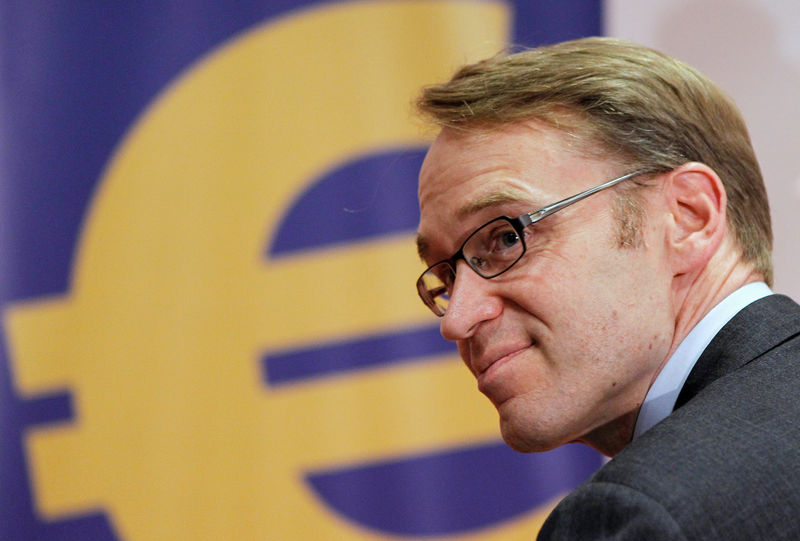By Balazs Koranyi and Paul Taylor
FRANKFURT (Reuters) - Under assault from Germany's ruling politicians, European Central Bank President Mario Draghi has found an unusual ally: Jens Weidmann, head of the Bundesbank and normally his biggest critic.
Having long condemned ECB efforts to stimulate the euro zone economy with a mix of easy money, sub-zero rates and asset buys, Weidmann unexpectedly leapt to the Bank's defense after German Finance Minister Wolfgang Schaeuble accused it last month of harming German savers and so helping the eurosceptic AfD party.
Neither Weidmann nor the Bundesbank wanted to comment for this article on what lay behind his more conciliatory tone.
But while Weidmann's endorsement of ECB policy gives Draghi some respite, conversations with eight sources in and close to the ECB's Governing Council indicated it signals no change in the hostility of the Bundesbank toward Draghi's stimulus line and is instead seen as Weidmann preparing for battles ahead.
Specifically, those sources interpreted Weidmann's move as an attempt to recoup his influence within the bank in time for the next big debate: whether there is a need for more stimulus and how existing measures should start to be wound down.
"Weidmann lost influence in the (ECB) Governing Council because of his negative spoiler role and his public criticism of decisions taken collectively," one of the sources said of Weidmann's past habit of attacking ECB decisions, sometimes within hours of them being made public.
"Weidmann shows some signs of returning to the mainstream and is finally starting to defend the ECB against political attacks in Germany after having done everything to legitimize such attacks by systematically opposing ECB policy initiatives."
Having long branded Draghi's easing course as unnecessary and insisting that forecasts of inflation persistently falling short of target were not worrisome because of benign underlying figures, Weidmann has gradually changed tack -- for example calling the ECB's expansionary line "appropriate" in April.
He now describes inflationary pressures as "extremely" weak and says missing the inflation target of close to two percent for too long would endanger the bank's credibility -- a shift from his previous argument that higher core inflation points to underlying price growth and the need to hold steady on rates.
The motivation and significance of that shift are still being chewed over in central banking circles.
To be sure, inflation has failed to follow the more benign path Weidmann saw earlier. With oil prices having plunged in recent months, it turned negative again this year and has forced the bank to slash it projections to just 0.1 percent for 2016.
"Many of the risks outlined in October and December have materialized and Weidmann realized that the ECB was not wrong that it acted," said one Governing Council member.
"Of course he’ll never say the ECB was completely right but he accepts that the Bundesbank's 'don't do anything' stance has become untenable given how fast the outlook deteriorated."
Yet while some argue the fundamentals may have played into Weidmann's change of tack, others say the story is more complex.
VEHEMENCE
One source familiar with his thinking said Weidmann, a civil servant who once served as adviser to Chancellor Angela Merkel, was deeply upset by the vehemence of Schaeuble's criticism, believing it crossed the line of what politicians should say about monetary policy -- the preserve of the independent ECB.
But the Bundesbank's main line -- that of being fundamentally opposed to quantitative easing and further stimulus measures -- had not changed despite the perception of a softer tone and greater engagement, the source added.
"Weidmann is not a dictator and the Bundesbank is an archaic, conservative institution with a long tradition, great advisers and a history of scepticism toward the ECB. Any change at the Bundesbank will be slow and Weidmann couldn't change it quickly even if he wanted to," another Governing Council member said.
The shift rather points to a re-positioning and coalition-building for an official whose policy stances have been in the minority and whose behavior has on occasions alienated others, sources said.
In one such episode, Weidmann last year is said to have asked the ECB Governing Council to simply copy verbatim a previous objection to extending emergency liquidity assistance to Greek banks, not even bothering to repeat his argument because he knew he was in the minority.
Weidmann moreover infuriated Italian officials only last month by choosing a trip to Rome to criticize government efforts to cut debt as insufficient, earning a public rebuke from Prime Minister Matteo Renzi.
Weidmann's more conciliatory stance comes amid a domestic German debate over what many in the country see as a lack of German influence over the ECB, with one leading conservative lawmaker even saying the next ECB president must be German.
The fact that some seats on the ECB board are due to open up in 2018/2019 has even led to speculation -- dismissed by the source close to Weidmann -- that he is angling for one of them.

“Weidmann did the right thing, the honorable thing to stand up for the ECB’s independence because credibility is our biggest asset,” a Governing Council member said. “The changed tone is welcome but it doesn’t change the German line.”